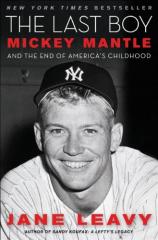The Last Boy: Mickey Mantle and the End of America's Childhood
Review
The Last Boy: Mickey Mantle and the End of America's Childhood
If she’s not careful, Jane Leavy will earn a reputation as the Boswell of the battered ballplayer. In 2002, she wrote the definitive biography (to this point) of the role model to Jewish boomers everywhere in SANDY KOUFAX: A Lefty's Legacy. In 2010, she published the much-anticipated story of another hero laid low by injury in THE LAST BOY: Mickey Mantle and the End of America's Childhood.
Whereas Koufax’s arthritic left arm dramatically shortened an amazing career at 30, how much better might Mantle have been without exacerbating his numerous injuries with his profligate ways? How many more home runs could he have powered over the outfield walls without the booze and the broads? Surely he would have retired with the .300 batting average he decided was the mark of a truly great player. Even the book jacket serves as evidence of Mantle’s degeneration, from a smiling rookie with unlimited potential to a broken down veteran, almost literally on his last legs.
“The End of America’s Childhood” came not with Mantle’s death in 1995, but with his retirement almost 30 years earlier (which I suppose is a kind of death). The Yankees --- indeed Boomer America itself --- seemed to fall from innocence with the assassination of John F. Kennedy. Since then, the reverence that would have precluded books such as Jim Bouton’s BALL FOUR and Jose Canseco’s JUICED that take a heroic figure off the pedestal and put him under the microscope have become the norm, and heretofore reverential tomes flew out the window. It was no longer enough to write about hard work and gumption; now every subject had to overcome some traumatic obstacle, whether it was substance or sexual abuse (or, as it turns out in Mantle’s case, both).
Leavy, an award-winning former sports and features writer for the Washington Post, admits to being an unabashed Mantle fan since childhood --- and the journalist’s objectivism be damned. In that, she shares his fans’ adoration and disappointment. But in demonstrating her impressive investigative skills, Leavy goes perhaps a bit overboard as she deconstructs a few of Mantle’s tape-measure home runs and provides testimonials for his considerable athletic skills. It is admirable in scope, as she discusses bat velocity, angles and meteorological conditions with the scientific community, but does it really matter if the ball went 430 feet or 450 or 480? In a Cold War era where it was important for the American psyche to be the best at everything, this display of power was comforting, but such academic studies might have opened the door for the sabermetrics of today, where every action on the field is measured.
The author interviewed hundreds of people when researching the book to turn out this most in-depth look at the Commerce Comet yet published. But like the questionable tape measure home runs, the reader might wonder about the accuracy of memory, or even the downright fabrication for the sake of building up a personal connection to the Mick.
Leavy alternates between some of the biggest events in Mantle’s career (for better or worse) and her fateful interview in April 1983, when he was reduced to working as a glad-hander for an Atlantic City casino. Her rose-colored glasses were shattered. Who kidnapped her beloved Mick and replaced him with this boorish drunk with the foul mouth and roaming hands? Still, Leavy managed to retain her composure and professionalism to get the story done…and serve as the impetus for this book.
There is little joy in THE LAST BOY. Mantle’s accomplishments were diminished in his eyes then and many baseball fans’ later on when they learned the extent of his boozing and womanizing. That his philosophy stemmed from his “live for today” attitude, based on his belief that he would die young, or came as a result of sexual abuse he suffered as a child (an aspect that doesn’t come until the end of the book, despite the play it got in the media), makes that outcome all the sadder. The description of his last days, when liver problems and cancer ravaged his once-powerful body, defies even the most sangfroid reader from becoming misty-eyed.
Reviewed by Ron Kaplan on October 3, 2011
The Last Boy: Mickey Mantle and the End of America's Childhood
- Publication Date: October 4, 2011
- Genres: Biography, Nonfiction
- Paperback: 512 pages
- Publisher: Harper Perennial
- ISBN-10: 0060883537
- ISBN-13: 97809780060883539





